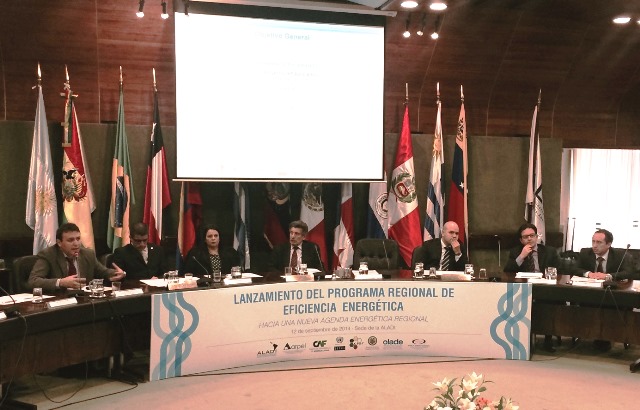
 The Latin American and Caribbean region has enormous market potential for energy efficiency, but tapping into that potential will take a coordinated push among actors in both the public and private sectors. That was the conclusion reached by participants in the recent launch of the Regional Energy Efficiency Program, part of an initiative called “Toward a New Regional Energy Agenda.”
The Latin American and Caribbean region has enormous market potential for energy efficiency, but tapping into that potential will take a coordinated push among actors in both the public and private sectors. That was the conclusion reached by participants in the recent launch of the Regional Energy Efficiency Program, part of an initiative called “Toward a New Regional Energy Agenda.”
The launch took place on September 12 at the headquarters of the Latin American Integration Association (ALADI) in Montevideo, Uruguay. ALADI and the OAS are among the eight organizations involved in this effort to develop a more robust market for energy efficiency projects in the region.
The potential demand for energy efficiency across different areas of the economy—including the industrial, trade, transportation, and residential sectors—represents a major economic opportunity that could help the region become more competitive, ALADI said in a press release. Although many Latin American countries have developed a market for energy efficiency projects, it said, regulatory and other barriers still exist.
The regional program is a result of studies that were done to analyze the energy sector in Latin America and the Caribbean and ascertain key energy issues for the region to address. Energy efficiency was one of the strategic areas identified.
The participating institutions designed a comprehensive program with steps each institution could take, within its area of expertise, to strengthen and expand the market for energy efficiency projects. The event in Montevideo laid out the activities that will be undertaken, as well as financing opportunities that will be available through the Development Bank of Latin America (CAF).
Specific steps include the development of performance indicators for the region and inventories of energy efficiency projects, as well as activities to provide for training, exchange, and promotion and to support governments in these endeavors. CAF announced that it will implement a series of financing mechanisms, with funds from the German development bank KfW: one credit facility to fund supply-based energy efficiency projects; another for demand-based projects; and a non-reimbursable technical assistance fund to support the development of energy audits and project investment appraisals.
In addition to ALADI, the OAS, and CAF, the participating organizations are the Regional Association of Oil, Gas and Biofuels Sector Companies in Latin America and the Caribbean (ARPEL), the Economic Commission for Latin America and the Caribbean (ECLAC), the Regional Energy Integration Commission (CIER), the Latin American Energy Organization (OLADE), and the World Energy Council (WEC).
Energy efficiency is one of the priority issues for the Energy and Climate Partnership of the Americas, which is coordinated through the OAS. Carolina Peña, who specializes in energy efficiency at the OAS Department of Sustainable Development, represented the OAS at the recent event.
 View Map
View Map